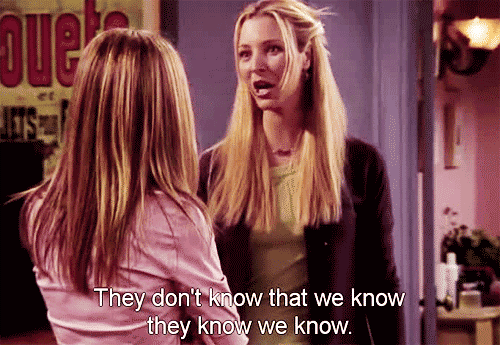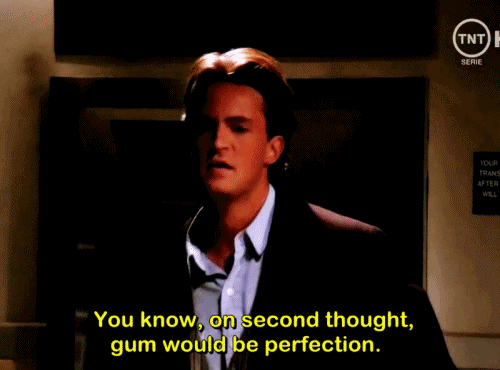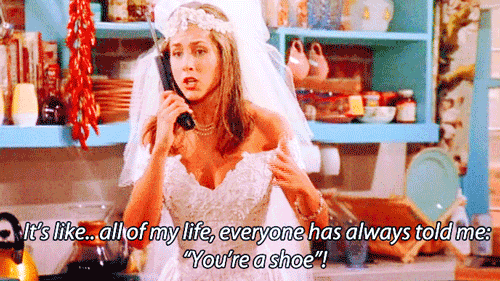6 Quarter-Life Realizations About Body Image (As Illustrated By “Friends”)
Requests: 0
Views: 24
I turned 24 on December 15th, and over the past five years of working toward recovery from my eating disorder, I’ve come to look at my body—and myself—in ways I couldn’t have imagined.
Some of the most meaningful realizations I’ve gained have come from being curious: curious about my relationship with my body, and curious about how I see women’s bodies represented in the public sphere. So I’m viewing my quarter-life marker as a chance to reflect—rather than jump into an age-fueled crisis. Here are six things I’ve realized through my very brief 24 years, as told by some good Friends:
 I know this is a typical phrase we hear a lot, but it took me a long time to actually believe—and feel—the truth of this. So I’ve got inside information that societal norms won’t tell you. My worth doesn’t originate from the amount of force I exert on the earth (that’s the technical term for weight). It doesn’t come from the number sewn onto my dress. It does not—and will not—directly correlate with the increase or decrease of the size of my body. My worth, in fact, doesn’t change. I am worthy of taking up space, just because I am. I’m valuable because I am. And no one—and no measurement—can take that away.
I know this is a typical phrase we hear a lot, but it took me a long time to actually believe—and feel—the truth of this. So I’ve got inside information that societal norms won’t tell you. My worth doesn’t originate from the amount of force I exert on the earth (that’s the technical term for weight). It doesn’t come from the number sewn onto my dress. It does not—and will not—directly correlate with the increase or decrease of the size of my body. My worth, in fact, doesn’t change. I am worthy of taking up space, just because I am. I’m valuable because I am. And no one—and no measurement—can take that away.
 I let the “should” monsters define this word for me. Those little monsters in my head that told me I wasn’t loveable, smart, fun, etc. unless I was “perfect”—which at various times meant I should be skinny, pretty, put-together and a whole host of other conditions. To counter these monsters, one day about a year into my time in treatment I looked up perfect in a dictionary (yes, I had a lot of time on my hands). So here it is: perfect (adj.) “free from any flaw or defect in condition or quality; faultless.” Okay, so a “perfect” person or body, by this definition, sounds incredibly and unbelievably “meh.” I’m not a faultless individual, but it’s because of my faults, flaws and defects—not in spite of them—that I am me. I’ve realized that I am marvelously better than “perfection.”
I let the “should” monsters define this word for me. Those little monsters in my head that told me I wasn’t loveable, smart, fun, etc. unless I was “perfect”—which at various times meant I should be skinny, pretty, put-together and a whole host of other conditions. To counter these monsters, one day about a year into my time in treatment I looked up perfect in a dictionary (yes, I had a lot of time on my hands). So here it is: perfect (adj.) “free from any flaw or defect in condition or quality; faultless.” Okay, so a “perfect” person or body, by this definition, sounds incredibly and unbelievably “meh.” I’m not a faultless individual, but it’s because of my faults, flaws and defects—not in spite of them—that I am me. I’ve realized that I am marvelously better than “perfection.”
 As a woman, I grew up seeing ads that used my gender to sell products. I imagine a bunch of old white men sitting in an office (think Mad Men, but older) sipping whiskey in crystal glasses and figuring out how to boost Carl Jr.’s sales. “Hey, you know what will really sell those? Let’s put a bikini-clad pretty young thing in an ad, we’ll have her eat our new burger in slow motion. I bet it will be our greatest ad yet.” Nailed it. Granted, I’ve never been in an ad agency building, let alone an agency meeting, but this is a real commercial. Apparently the actual burger can’t sell the burger, but a woman’s body can. There’s also (what I think is) a more insidious marketing tactic that uses women’s bodies that’s grown in the past few years. In October, I wrote about how a new Special K Canada campaign joined the growing mass of corporate body-positivity marketing. In Special K’s case, the company is “selling” consumers self-worth through cereal by co-opting the body-positive movement to grow profits. In either case, I frustratingly look at the advertisements and want to scream, “Stop using my body to sell your soap!” because I know that my body is not a marketing tool—it’s my home and it’s not on the market.
To read the rest of these realizations in this story from our partner, Proud2BMe, click here.
As a woman, I grew up seeing ads that used my gender to sell products. I imagine a bunch of old white men sitting in an office (think Mad Men, but older) sipping whiskey in crystal glasses and figuring out how to boost Carl Jr.’s sales. “Hey, you know what will really sell those? Let’s put a bikini-clad pretty young thing in an ad, we’ll have her eat our new burger in slow motion. I bet it will be our greatest ad yet.” Nailed it. Granted, I’ve never been in an ad agency building, let alone an agency meeting, but this is a real commercial. Apparently the actual burger can’t sell the burger, but a woman’s body can. There’s also (what I think is) a more insidious marketing tactic that uses women’s bodies that’s grown in the past few years. In October, I wrote about how a new Special K Canada campaign joined the growing mass of corporate body-positivity marketing. In Special K’s case, the company is “selling” consumers self-worth through cereal by co-opting the body-positive movement to grow profits. In either case, I frustratingly look at the advertisements and want to scream, “Stop using my body to sell your soap!” because I know that my body is not a marketing tool—it’s my home and it’s not on the market.
To read the rest of these realizations in this story from our partner, Proud2BMe, click here.
1. My self-worth isn’t based on my size.
 I know this is a typical phrase we hear a lot, but it took me a long time to actually believe—and feel—the truth of this. So I’ve got inside information that societal norms won’t tell you. My worth doesn’t originate from the amount of force I exert on the earth (that’s the technical term for weight). It doesn’t come from the number sewn onto my dress. It does not—and will not—directly correlate with the increase or decrease of the size of my body. My worth, in fact, doesn’t change. I am worthy of taking up space, just because I am. I’m valuable because I am. And no one—and no measurement—can take that away.
I know this is a typical phrase we hear a lot, but it took me a long time to actually believe—and feel—the truth of this. So I’ve got inside information that societal norms won’t tell you. My worth doesn’t originate from the amount of force I exert on the earth (that’s the technical term for weight). It doesn’t come from the number sewn onto my dress. It does not—and will not—directly correlate with the increase or decrease of the size of my body. My worth, in fact, doesn’t change. I am worthy of taking up space, just because I am. I’m valuable because I am. And no one—and no measurement—can take that away.
2. “Perfection” is quite dull.
 I let the “should” monsters define this word for me. Those little monsters in my head that told me I wasn’t loveable, smart, fun, etc. unless I was “perfect”—which at various times meant I should be skinny, pretty, put-together and a whole host of other conditions. To counter these monsters, one day about a year into my time in treatment I looked up perfect in a dictionary (yes, I had a lot of time on my hands). So here it is: perfect (adj.) “free from any flaw or defect in condition or quality; faultless.” Okay, so a “perfect” person or body, by this definition, sounds incredibly and unbelievably “meh.” I’m not a faultless individual, but it’s because of my faults, flaws and defects—not in spite of them—that I am me. I’ve realized that I am marvelously better than “perfection.”
I let the “should” monsters define this word for me. Those little monsters in my head that told me I wasn’t loveable, smart, fun, etc. unless I was “perfect”—which at various times meant I should be skinny, pretty, put-together and a whole host of other conditions. To counter these monsters, one day about a year into my time in treatment I looked up perfect in a dictionary (yes, I had a lot of time on my hands). So here it is: perfect (adj.) “free from any flaw or defect in condition or quality; faultless.” Okay, so a “perfect” person or body, by this definition, sounds incredibly and unbelievably “meh.” I’m not a faultless individual, but it’s because of my faults, flaws and defects—not in spite of them—that I am me. I’ve realized that I am marvelously better than “perfection.”
3. My body should not be a marketing strategy.
 As a woman, I grew up seeing ads that used my gender to sell products. I imagine a bunch of old white men sitting in an office (think Mad Men, but older) sipping whiskey in crystal glasses and figuring out how to boost Carl Jr.’s sales. “Hey, you know what will really sell those? Let’s put a bikini-clad pretty young thing in an ad, we’ll have her eat our new burger in slow motion. I bet it will be our greatest ad yet.” Nailed it. Granted, I’ve never been in an ad agency building, let alone an agency meeting, but this is a real commercial. Apparently the actual burger can’t sell the burger, but a woman’s body can. There’s also (what I think is) a more insidious marketing tactic that uses women’s bodies that’s grown in the past few years. In October, I wrote about how a new Special K Canada campaign joined the growing mass of corporate body-positivity marketing. In Special K’s case, the company is “selling” consumers self-worth through cereal by co-opting the body-positive movement to grow profits. In either case, I frustratingly look at the advertisements and want to scream, “Stop using my body to sell your soap!” because I know that my body is not a marketing tool—it’s my home and it’s not on the market.
To read the rest of these realizations in this story from our partner, Proud2BMe, click here.
As a woman, I grew up seeing ads that used my gender to sell products. I imagine a bunch of old white men sitting in an office (think Mad Men, but older) sipping whiskey in crystal glasses and figuring out how to boost Carl Jr.’s sales. “Hey, you know what will really sell those? Let’s put a bikini-clad pretty young thing in an ad, we’ll have her eat our new burger in slow motion. I bet it will be our greatest ad yet.” Nailed it. Granted, I’ve never been in an ad agency building, let alone an agency meeting, but this is a real commercial. Apparently the actual burger can’t sell the burger, but a woman’s body can. There’s also (what I think is) a more insidious marketing tactic that uses women’s bodies that’s grown in the past few years. In October, I wrote about how a new Special K Canada campaign joined the growing mass of corporate body-positivity marketing. In Special K’s case, the company is “selling” consumers self-worth through cereal by co-opting the body-positive movement to grow profits. In either case, I frustratingly look at the advertisements and want to scream, “Stop using my body to sell your soap!” because I know that my body is not a marketing tool—it’s my home and it’s not on the market.
To read the rest of these realizations in this story from our partner, Proud2BMe, click here.
Reactions